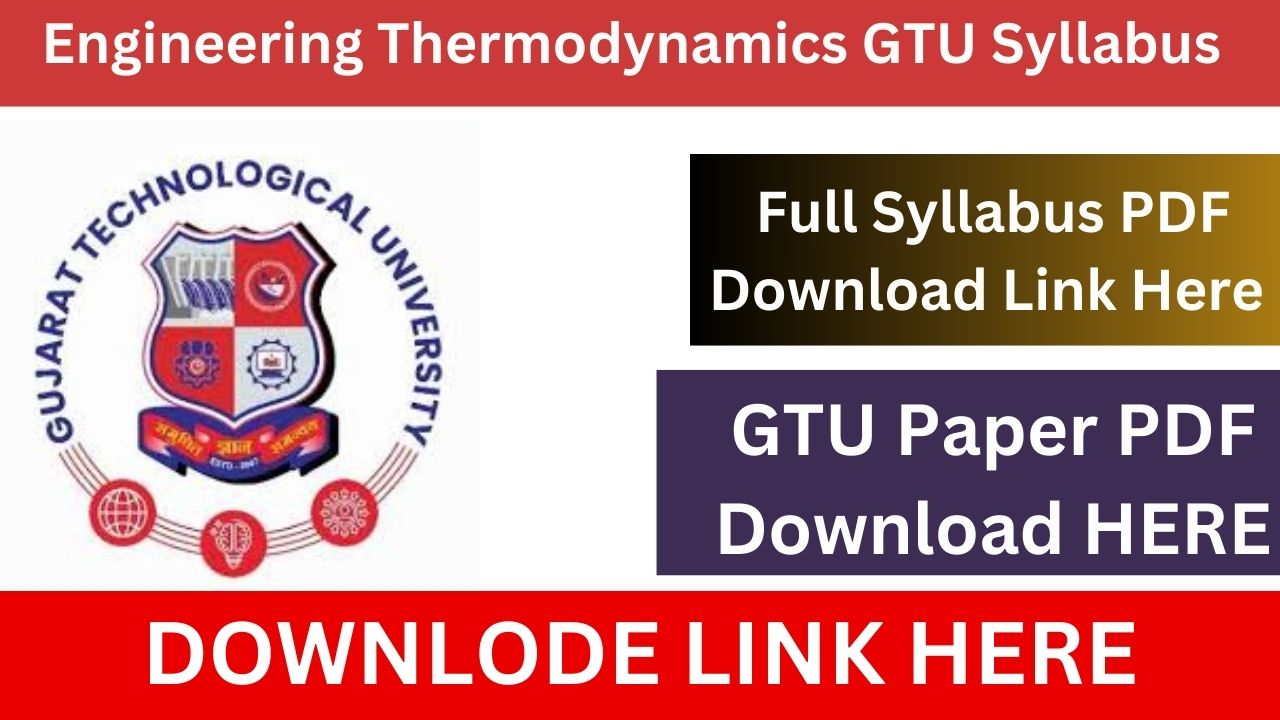Engineering Thermodynamics GTU Syllabus: Engineering Thermodynamics is an essential subject in the curriculum of mechanical, chemical, and civil engineering students. The course at Gujarat Technological University (GTU) equips students with a fundamental understanding of energy systems, heat, and work, which are vital in various engineering applications. GTU’s syllabus for Engineering Thermodynamics is carefully structured to offer theoretical concepts, practical insights, and problem-solving techniques necessary for aspiring engineers.
This article provides a detailed overview of the Engineering Thermodynamics syllabus at GTU, including key topics covered, learning objectives, and how this knowledge benefits students in their engineering careers.
FULL GTU Syllabus Link PDF Download Here
Engineering Thermodynamics GTU Syllabus Overview
The Engineering Thermodynamics course at GTU spans multiple semesters, focusing on building a strong foundation in thermodynamic principles. The syllabus is designed to balance theoretical knowledge with practical application, allowing students to develop the skills needed for solving real-world engineering problems.
Syllabus Breakdown
Here is an outline of the key topics typically included in the GTU Engineering Thermodynamics syllabus:
1. Basic Concepts and Laws of Thermodynamics
- Introduction to Thermodynamics: Basic definitions, concepts, and the role of thermodynamics in engineering.
- First Law of Thermodynamics: Understanding energy conservation, internal energy, heat, and work. Applications of the first law in energy systems.
- Second Law of Thermodynamics: Entropy, the concept of reversible and irreversible processes, and the Kelvin-Planck and Clausius statements.
- Third Law of Thermodynamics: Absolute zero of temperature and the entropy of a system as temperature approaches absolute zero.
2. Properties of Pure Substances
- Phases and Phase Diagrams: Understanding the properties of substances in different phases—solid, liquid, and gas.
- P-V-T Relations: How pressure, volume, and temperature relate to one another for pure substances.
- T-s and h-s Diagrams: Use of temperature-entropy (T-s) and enthalpy-entropy (h-s) diagrams to analyze various thermodynamic processes.
3. Thermodynamic Cycles
- Ideal Gas Cycle: Study of the fundamental cycles used in power generation (Rankine cycle, Brayton cycle) and refrigeration.
- Carnot Cycle: Theoretical maximum efficiency of heat engines and refrigerators.
- Real vs. Ideal Cycles: Understanding real-world deviations from ideal cycles and the impact of various inefficiencies.
- Vapour Power Cycles: Rankine cycle, ideal and actual performance, and improvements like reheat and regenerative cycles.
- Refrigeration and Heat Pump Cycles: Basic principles and applications in cooling systems.
4. Energy Analysis of Closed and Open Systems
- Closed Systems: Energy balance in thermodynamic systems that do not exchange mass with the surroundings.
- Open Systems (Control Volumes): Analysis of systems where mass and energy flow in and out (e.g., turbines, compressors).
- Application to Practical Systems: Use of energy analysis in power plants, engines, and HVAC systems.
5. Thermodynamic Properties of Ideal and Real Gases
- Ideal Gas Laws: Mathematical relationships governing the behavior of ideal gases.
- Real Gas Behavior: Deviations from the ideal gas law, including Van der Waals and Redlich-Kwong equations.
- Compressibility Factor: A dimensionless quantity used to describe the behavior of real gases.
6. Entropy and Exergy
- Entropy: Concept, mathematical treatment, and application to irreversible processes.
- Exergy Analysis: Maximum useful work obtainable from a system in a given environment.
- Application in Power Generation: How entropy and exergy principles are applied in the optimization of thermal power plants.
7. Heat Engines, Refrigerators, and Heat Pumps
- Heat Engines: Analysis of the working of heat engines and their efficiency.
- Refrigeration Cycles: Thermodynamic principles behind refrigeration and air conditioning systems.
- Heat Pumps: Heat pump cycles and their role in space heating and cooling.
8. Combustion and Fuels
- Combustion Processes: Basic principles of combustion, fuel types, and stoichiometric calculations.
- Performance of Fuels: Understanding calorific value, efficiency, and environmental impact of different fuels.
- Applications in Engine Technology: Combustion in internal combustion engines and gas turbines.
9. Applications in Real-World Systems
- Power Generation: Thermodynamics in steam, gas, and nuclear power plants.
- Refrigeration and Air Conditioning: Application of thermodynamic principles in cooling and heating systems.
- Automotive and Aerospace: Thermodynamics in internal combustion engines and jet propulsion.
Engineering Thermodynamics GTU Syllabus: Learning Outcomes
By completing the Engineering Thermodynamics course at GTU, students are expected to:
- Master the Fundamental Concepts: Grasp key thermodynamic principles such as laws, cycles, and processes.
- Analyze and Solve Problems: Apply thermodynamic knowledge to solve real-world problems, including energy systems, engines, and HVAC systems.
- Understand Energy Efficiency: Assess the efficiency of thermodynamic cycles and identify opportunities for improvements in energy conservation.
- Enhance Practical Skills: Gain hands-on experience through laboratory work and project-based learning.
Importance of Engineering Thermodynamics for Engineers
Thermodynamics is at the heart of most engineering disciplines. For students at GTU, mastering thermodynamics provides essential skills for:
- Designing Energy-Efficient Systems: Whether in power plants, HVAC systems, or transportation, thermodynamic principles allow engineers to design systems that optimize energy usage.
- Improving Engine Performance: A thorough understanding of combustion, thermodynamic cycles, and heat transfer helps improve engine and turbine efficiency in various applications.
- Sustainability and Environmental Engineering: Thermodynamic knowledge is crucial for developing sustainable and eco-friendly technologies, such as renewable energy systems, hybrid vehicles, and refrigeration technologies with minimal environmental impact.
- Problem-Solving and Innovation: Engineers use thermodynamics to tackle real-world problems in energy, heat transfer, and fluid dynamics.
Conclusion
The Engineering Thermodynamics syllabus at GTU provides a comprehensive and practical foundation for understanding the laws of thermodynamics and their application in engineering. By covering essential topics like energy conservation, thermodynamic cycles, entropy, and exergy, the syllabus prepares students for careers in various industries, including power generation, automotive, aerospace, and environmental engineering. Mastery of these concepts not only enhances problem-solving skills but also fosters innovation in creating energy-efficient and sustainable systems for the future.
